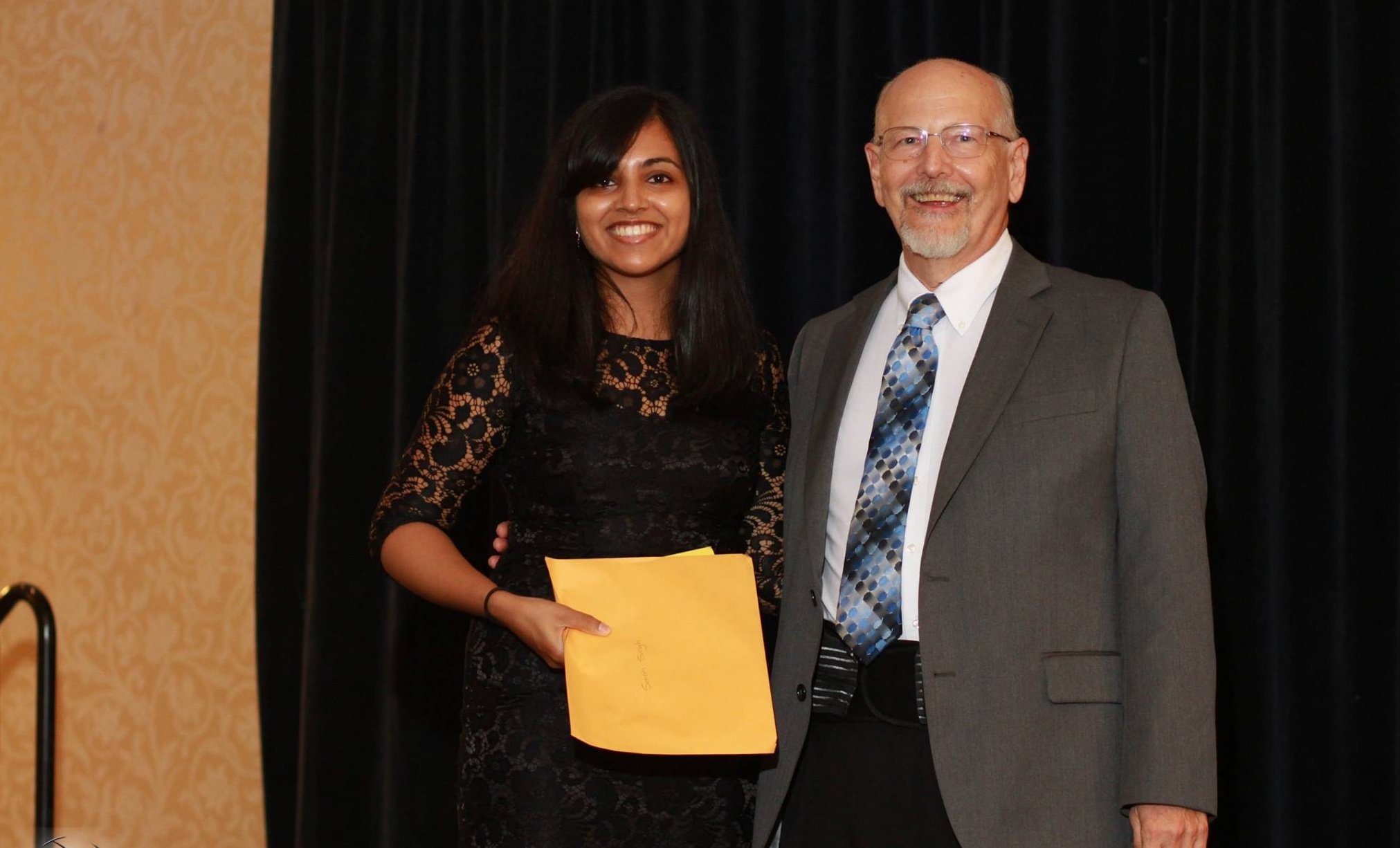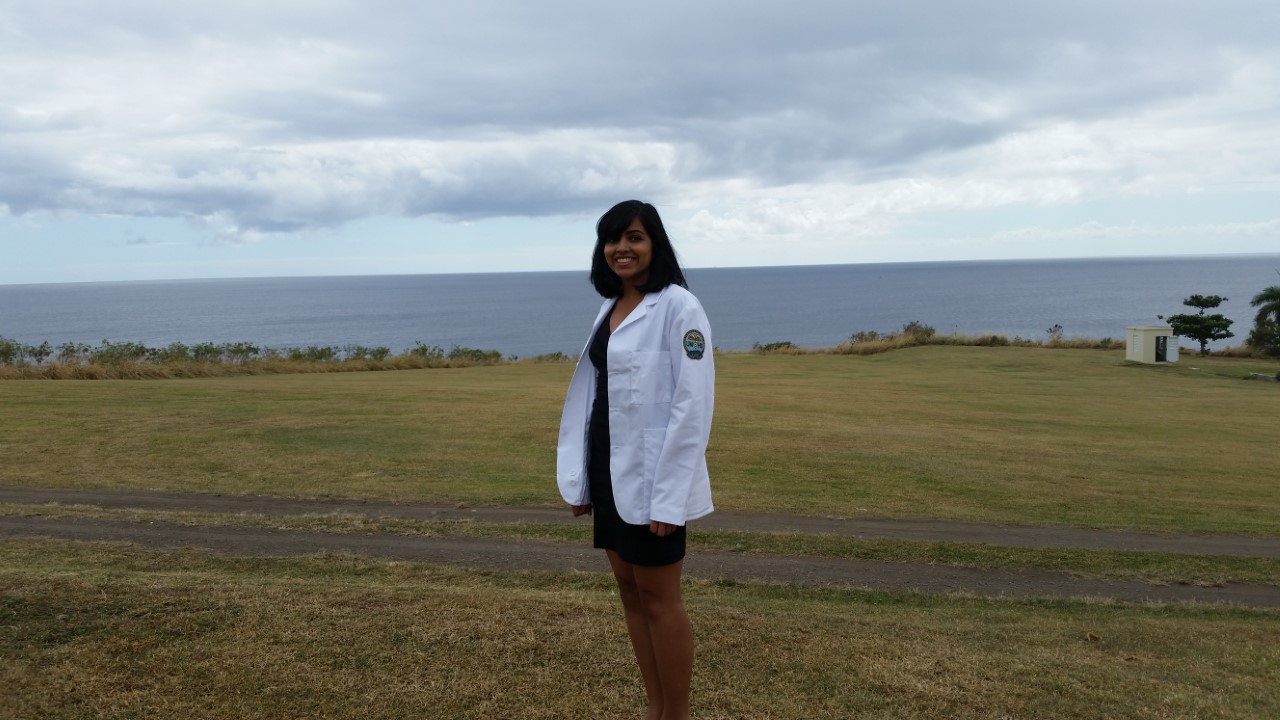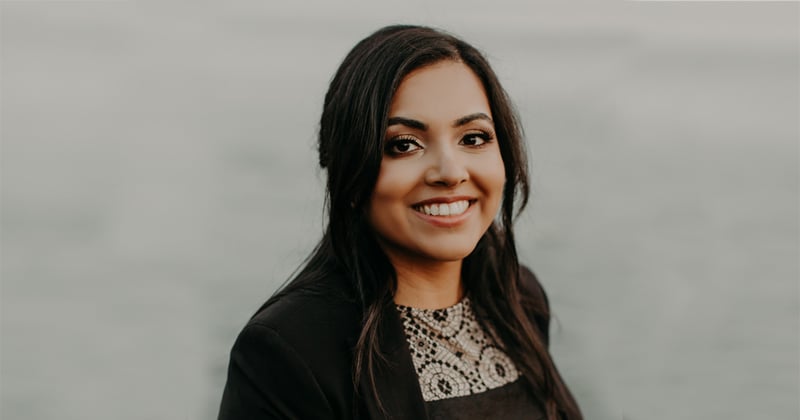UMHS Class of 2021 graduate Dr. Sarah Singh first discovered her interest in medicine by spending time with her grandfather, an ENT (Ear, Nose and Throat specialist). Dr. Singh—born and raised in Surrey, British Columbia, Canada—starts an Internal Medicine residency at West Virginia University School of Medicine this summer.
The UMHS Endeavour spoke to Dr. Singh about her early interest in medicine, why she chose UMHS over other medical schools, her thoughts on Internal Medicine and her residency, challenges of med school during the COVID-19 pandemic, and more.
 At-a-glance
At-a-glance
Free guide
Internal Medicine: Is it the right specialty for you?
- Future job outlook
- Salary & work statistics
- Subspecialties + advice from UMHS Alumni
Quick access. No spam. 10 pages.
Grandfather influenced her decision to become a doctor
While growing up in Surrey, BC, near Vancouver, young Sarah loved spending days with her grandfather.
“My grandfather was an ENT so I had an early influence into the world of medicine. He and I spent a lot of time going through his old anatomy textbooks and such. He passed away when I was in fifth grade and I had decided then that I would pursue a career in medicine myself. I never looked back.”
She received her bachelor’s degree in biology at the University of British Columbia. While studying as an undergrad, she learned all she could about medicine. While leading her school’s premed society, she learned about UMHS during an information session.
“I was President of the Pre-Medical Society at my alma mater and so I was in charge of setting up/helping out when various medical schools conducted information sessions at the university,” she said. “I met [former UMHS Canadian admissions rep] Geneviève Gagne this way and she ended up being the person who conducted my medical school entrance interview. She gave a very good first impression compared to the other schools I worked with. I remember being impressed with what UMHS had to offer— the small class sizes and the after-school TA sessions being especially important to me. I had also heard a lot of good things about the professors and how they taught. In the end, I went with my gut and chose UMHS.”
 Dr. Sarah Singh accepting the Robert Ross Scholar Award from Dr. Edwin Purcell. Photo: GP Vision Photography.
Dr. Sarah Singh accepting the Robert Ross Scholar Award from Dr. Edwin Purcell. Photo: GP Vision Photography.
Professors & staff who made a difference
Dr. Singh said UMHS professors and staff members both in St. Kitts and Maine were especially helpful or inspiring but a few stood out.
“From the get-go, Dr. Thomas Last [Professor of Cell Biology] made each new class feel welcomed and important. I had never been away from home like this before, so knowing that your presence in class was wanted was really important. Dr. Thomas McCracken [Course Director & Professor of Gross Anatomy] and his sheer breadth of knowledge were also inspiring. I think Biochemistry with [Dean of Student Affairs, Chairman of Molecular Sciences and Course Director and Professor of Biochemistry] Dr. Prakash Mungli was one of my favorite classes, ever. He made every lecture not only informative but fun so you wanted to learn the material. When he dangled the Biochemistry Certificate of Excellence over our heads, it was harder still not to want to do well in his class. Aside from teaching, Dr. Mungli is a genuinely good person and was always planning hikes and other activities to get students together. In my third semester, Physiology was my favorite class and I definitely asked Professor of Physiology Dr. Jagadeesh Nagappa more questions than he wanted to answer. In my fourth semester, Neurology with Professor of Neuroscience Dr. Michael Doherty and Pathology I with [Chair, Course Director and Professor of Pathology] Dr. Alfred Roy were my favorites.
“Dr. Michael Doherty gave the best advice, both for school and for life, and seeing how proud Dr. Roy was whenever his students succeeded made you want to do better. Finally, in fifth semester I took Pathology II with [Professor of Pathology] Dr. Anoop Kumar Jalan. Dr. Jalan was a very passionate teacher and I wish we could have seen more of him in class. I will also never forget Mia Jaworski [Associate Director of Academic Support and Student Affairs] in the Maine office who was invaluable in helping me through Step 1 prep and more.”
The advantages of Caribbean medical schools
Caribbean medical schools definitely give one an advantage and also build character on the road to residency.
“I tell this to everyone who questions my Caribbean experience but I definitely believe it makes you stronger and humbler,” she said. “Living in St. Kitts but getting a first-world education is a big contrast. Then having to go to the US, moving from state to state to complete rotations; it changes you. The amount of exposure we get from this experience is unparalleled and I strongly believe it's a strength, in our favor. We are resilient and adaptable because of our experiences. There is a stigma against us as IMGs. If you're not from the US, that stigma can be even worse and in order to do well and Match you have to overcome that. This path is not for the faint of heart but will definitely allow you to become the doctor you want to be if you put the work in.”
 Dr. Sarah Singh outside in St. Kitts after the UMHS White Coat Ceremony. Photo courtesy of Dr. Singh.
Dr. Sarah Singh outside in St. Kitts after the UMHS White Coat Ceremony. Photo courtesy of Dr. Singh.
Preparing for the Match
With the unprecedented problem of COVID-19, applying for the residency Match this year was problematic.
“This was a strange Match cycle in that everything was virtual because of the pandemic,” she said. “However, I tried to hold tight to the belief that others before me had matched and that I would, too. Speaking to [Associate Dean of Academic & Student Affairs in New York] Patrick McCormick was also a good way for me to boost my own morale and since I first emailed him in second semester, there have been numerous times he has given me the pep talk I needed to feel reassured that I would make it. On the interview trail I was often asked about my views on attending a Caribbean medical school and I offered the same explanation I gave above—that it changes you for the better, that attending a school like this, traveling across the country for rotations, the sheer amount of exposure to different medical systems and processes makes you that much stronger. When asked about my biggest strength, I also brought up that I was an IMG, had attended a Caribbean medical school and how those two factors made me a stronger applicant.”
Internal Medicine residency at West Virginia School of Medicine
Obtaining an Internal Medicine residency at West Virginia School of Medicine has been exciting news indeed. She is especially interested in working with patients living in Medically Underserved Areas from rural regions of Appalachia.
“I will be at Camden Clark Medical Center [in Parkersburg, WV]. This was the first program I interviewed with and I kind of knew from then that this is where I would end up. Everyone I spoke with was very welcoming and I felt like I belonged right from the interview. It's in a more rural area so there's a fair amount of interesting pathology that comes in. This program also offers the opportunity to learn how to do procedures, such as central line insertion, chest tube placement, and others. The IM residency program is also the only residency program at this hospital so, unlike in other areas, I won't have to fight with other residents over the chance to do procedures or see patients, I can do it all. They also do a fair amount of community outreach which was important to me. Suffice to say, I'm very happy about matching into this program”
Dr. Singh was always interested in Internal Medicine and clinical rotations helped her decide on pursuing this specialty.
“I always had an inkling that I would go into IM [Internal Medicine} but after my IM core rotation, which was my first clinical rotation, I knew for sure. I completed my core IM rotation in Chicago with Dr. Mizuno and his way of approaching medicine and patients was just astounding. It's a tough rotation but worth every bit of sleeplessness. I just loved how he taught us to interpret lab values and how much information you can glean about a patient just from that. One of my favorite things about medicine is how much of a puzzle it can be and this aspect of patient care spoke to that. I also like that, in IM, I get to see a wide variety of cases from all different systems of the body and that it's more acute care. I like getting into the nitty gritty of why a patient presents the way they do. I also like being able to educate patients on why their body is reacting the way it does and really bond with them. IM allows me to do all of those things and more. I did entertain doing a Med/Peds residency after an amazing Pediatrics rotation with Dr. Caplan at Sinai Hospital Baltimore but after my IM Sub-I, also at Sinai, I realized IM was truly where I belonged.”
She has many goals planned for her residency and beyond.
“I want to focus on being the best physician I can be. I want to be someone my colleagues and patients can rely on and are happy to have on their team. I also want to be able to continue to do research and perhaps, in time, apply for a fellowship.”
Her advice to current and incoming UMHS students is to stay focused and determined from basic sciences all the way up to Match interviews.
“It's a tough road and it can be hard to keep going when you hit a snag. It's easy to get caught in the study rut and not feel ready for exams, to hold off on the next step. It can be especially hard when things don't go as you planned, when you see others succeeding around you. That's where the determination and discipline comes in. Keep your head up. Find a good support group to keep you up when you feel down, but accept that you will feel down, that no one's perfect and your best is your best. Believe in yourself because ultimately, that is what will get you through. When it comes to the Match, trust your gut and focus on what makes you happy.”
Challenges of med school during the pandemic
Medical school in general is tough, but it has been even more challenging the past 18 months during the COVID-19 pandemic. While the general public has more appreciation for doctors because of what has transpired, things have not been easy and remain uncertain even as more and more people are vaccinated.
“I think that many people are in the dark about the day-to-day lives of medical students and doctors,” Dr. Singh said. “When I tell others— who aren't in medicine— what life was/will be like as a student or resident, they're often in shock. I've watched the waves of burnout increase across the globe as the pandemic continues to rage on and I just hope to be able to ease some of that burden.”
There is still much work to be done on educating the public about diseases and vaccination, and this is where doctors can help answer questions and enlighten people.
“While I do believe, generally, the public has come to value health care professionals more than in the past, I also think the pandemic has emphasized places where public understanding can be enhanced even further. The pandemic has brought to light how much education is missing on things like disease transmission, propagation, and vaccination. Not to mention the mental health needs of the public and how ill-equipped our society is for things like this. I think a lot of medical students are hoping for a better future, having learned from mistakes made during the COVID-19 pandemic.”
For those considering a future in medicine, now is a great time to pursue one’s dreaming of becoming an MD. People studying at Caribbean medical schools should be proud.
“I would encourage any student who is questioned about attending a Caribbean medical school to own it. You earned that diploma on the wall; you deserve to be here. It isn't an easy journey but coming out at the end with a ‘Congratulations, you have Matched!’ notice makes it all worth it.”
(Top photo): Dr. Sarah Singh, originally from Surrey, BC in Canada, starts an Internal Medicine residency in West Virginia this summer. Photo courtesy of Dr. Singh.
 At-a-glance
At-a-glance
Free guide
Internal Medicine: Is it the right specialty for you?
- Future job outlook
- Salary & work statistics
- Subspecialties + advice from UMHS Alumni
Quick access. No spam. 10 pages.

Scott is Director of Digital Content & Alumni Communications Liaison at UMHS and editor of the UMHS Endeavour blog. When he's not writing about UMHS students, faculty, events, public health, alumni and UMHS research, he writes and edits Broadway theater reviews for a website he publishes in New York City, StageZine.com.

















